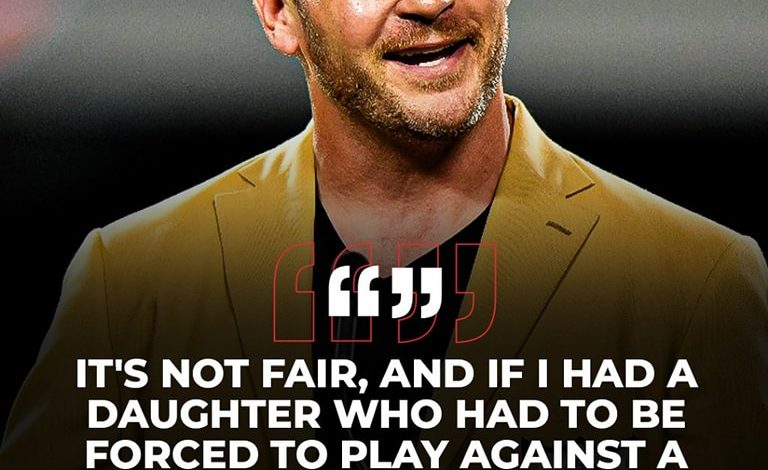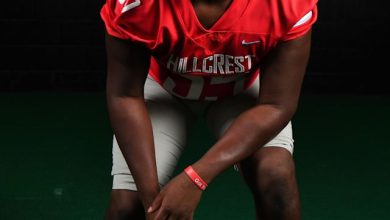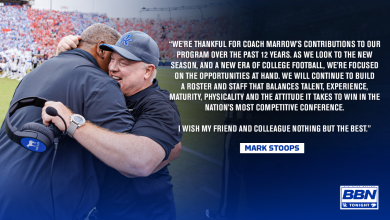Bears legend Brian Urlacher makes his stance clear on trans athletes competing in women’s sports.

Brian Urlacher, one of the most iconic figures in Chicago Bears history and a Hall of Fame linebacker known for his fierce competitiveness and leadership on the field, recently spoke out on a topic that has become one of the most debated and divisive issues in sports today: the participation of transgender athletes in women’s sports. Urlacher’s comments have sparked conversation and controversy, reflecting the complexity and sensitivity surrounding this topic.
In this article, we delve into Brian Urlacher’s perspective, the broader context of trans athletes in women’s sports, and the ongoing debate about fairness, inclusion, and the future of athletic competition.
Brian Urlacher: A Voice from Chicago’s Football Legacy
Brian Urlacher’s legacy with the Chicago Bears is legendary. Playing for 13 seasons, Urlacher was a dominant force at linebacker, earning eight Pro Bowl selections and winning the NFL Defensive Player of the Year Award in 2005. Known for his physicality, intelligence, and work ethic, Urlacher has remained a respected figure in football circles, often providing insights on current sports issues.
Given his status, his opinions carry weight, and when he chooses to speak out on social topics, many listen.
Urlacher’s Stance on Trans Athletes in Women’s Sports
Recently, during an interview on a sports podcast, Brian Urlacher was asked about the increasingly prominent topic of transgender athletes competing in women’s sports. Urlacher didn’t hesitate to make his views known.
In summary, Urlacher expressed concerns about fairness and the integrity of women’s sports. He emphasized the importance of ensuring a level playing field, stating that biological differences could give trans women competing in female categories a competitive advantage. Urlacher pointed out that sports are fundamentally based on physicality and competition, and he questioned how to balance inclusion with fair competition.
“I think it’s important to respect everyone’s identity, but at the same time, we’ve got to protect women’s sports. It’s a tough balance, but we need rules that make competition fair,” Urlacher said.
His remarks echoed a common viewpoint among many athletes, coaches, and fans who support policies that limit trans women’s participation in women’s sports categories to preserve what they see as competitive fairness.
The National Debate: Fairness vs. Inclusion
Urlacher’s comments come amid a nationwide debate on how best to approach the participation of transgender athletes. Advocates for transgender inclusion argue that sports should be accessible to all, regardless of gender identity, highlighting the importance of dignity, equality, and the mental health benefits of participation.
Opponents, including Urlacher and others, stress biological differences, such as muscle mass, bone density, and hormonal influences, that may give trans women an advantage in certain sports. They argue this creates an uneven playing field that could undermine female athletes’ opportunities.
This debate has led to different policies across states, school districts, and sports governing bodies, ranging from open inclusion to bans on transgender women competing in women’s sports.
Sports Governing Bodies and Policy Responses
Many sports organizations have been grappling with this issue. For example:
- The International Olympic Committee (IOC) updated guidelines to require transgender women to maintain specific testosterone levels to compete in women’s events.
- The NCAA allows transgender athletes to participate under certain hormone therapy conditions.
- Various states in the U.S. have passed laws either restricting or allowing transgender athlete participation in school sports.
Urlacher’s comments align with a growing call for policies that protect women’s sports, a stance reflected in recent legislation in some states.
The Science Behind the Debate
The core of the controversy lies in scientific questions about the physical advantages of transgender women. Several studies suggest that biological males generally have higher muscle mass, bone density, and cardiovascular capacity than biological females, even after hormone therapy. These factors can translate to performance advantages in strength, speed, and endurance.
However, medical and sports science experts note that research is still evolving. Hormone therapy can reduce some physical advantages, but how much it levels the playing field varies by sport and individual.
Urlacher, with his deep understanding of athletic performance, highlights these concerns, stressing that physicality is a critical element of sports competition.
Women’s Sports Advocates Support Urlacher’s Position
Many female athletes and advocates have supported Urlacher’s stance, expressing concern that transgender inclusion without restrictions could reduce opportunities for cisgender women. They argue for the preservation of women’s sports as a space that celebrates and advances female athletic achievement.
Famous athletes such as track star Allyson Felix and swimmer Lia Thomas have been part of public discussions on this issue, illustrating the complexity and emotional weight involved.
A Call for Compassion and Respect
While Urlacher’s position emphasizes fairness in competition, he also advocates for respect and compassion for transgender individuals. He acknowledges the personal struggles many face and stresses the need for thoughtful policies that consider everyone’s dignity.
“This isn’t about hate or discrimination — it’s about making sure everyone has a chance to compete fairly,” Urlacher said.
This nuance is important as the sports community seeks ways to navigate a divisive issue without marginalizing any group.
Broader Cultural Implications
The discussion about trans athletes is part of a larger cultural conversation about gender, identity, and rights. Sports often serve as a microcosm of societal debates, reflecting evolving norms and values.
Urlacher’s voice adds to this dialogue, representing many who want solutions that uphold both fairness and inclusion but acknowledge the challenges in achieving this balance.
Looking Forward: What’s Next for Sports and Society?
As more athletes and sports organizations weigh in, it’s clear that this issue won’t be resolved overnight. Key areas of focus moving forward include:
- Continued scientific research to better understand the effects of hormone therapy and biological factors on athletic performance.
- Development of clear, consistent policies by sports governing bodies that balance fairness and inclusion.
- Open, respectful dialogue between athletes, advocates, policymakers, and fans to foster understanding.
- Support systems for all athletes, ensuring mental and physical well-being regardless of gender identity.
Brian Urlacher’s stance serves as a catalyst for this ongoing conversation, highlighting the need for careful consideration and thoughtful action.
Brian Urlacher’s recent comments on transgender athletes competing in women’s sports bring attention to one of the most challenging issues facing modern athletics. As a respected Bears legend and athlete who understands the demands of competition, his perspective carries weight.
His call for fairness and respect encapsulates the core of the debate — how to create a sports environment that honors both inclusion and competitive integrity.
While opinions will continue to vary, one thing is clear: sports must evolve thoughtfully and compassionately, ensuring that all athletes have the opportunity to compete with dignity.
As this debate unfolds, figures like Brian Urlacher remind us of the complexity involved and the importance of balancing empathy with fairness in the ever-changing world of sports.









